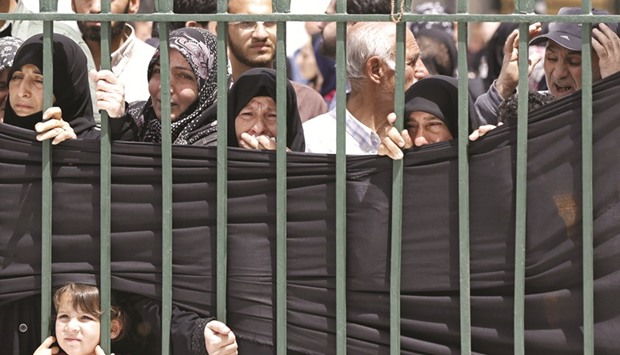Hundreds of tearful mourners attended a mass funeral yesterday for loved ones killed in a suicide bombing on a convoy of evacuees, in one of the Syrian war’s most gruesome attacks.
At least 150 people, including 72 children, were killed on April 15 in an explosion targeting evacuees from Fuaa and Kafraya, two Shia-majority villages under siege in northwestern Syria.
Fifty-two of the dead were to be buried yesterday near the Sayyida Zeinab mausoleum, Syria’s most visited pilgrimage site south of Damascus, one of the funeral organisers said.
Women, children, and men — some of them in military uniform — from Fuaa and Kafraya began gathering at the mosque from the morning to take part in the funeral procession.
Security was tight, with Syrian army soldiers and allied forces carefully searching every person entering the shrine’s perimeter, AFP’s correspondent said.
“There’s no worse feeling than this, than burying your sister without being able to see her,” said 19-year-old Abdelsalam Remman, his voice breaking.
He was carrying a poster of his six-year-old sister Tuqa, who was killed in the attack after being evacuated with their mother, who was wounded.
“Our heart melted until we identified her” among those of the dead several days later, said Remman.
The suicide car bombing in Rashidin, west of Syria’s second city Aleppo, was one of the most devastating attacks of the six-year war that has killed at least 320,000.
It hit a convoy of evacuees from Fuaa and Kafraya, who had been bussed out of their besieged government-held villages as part of an evacuation deal that also included two rebel-controlled towns surrounded by the regime.
The attacker appeared to lure children to his vehicle with bags of crisps, according to witnesses.
Dozens of unidentified bodies remain at Aleppo’s government hospital, and many survivors at Sayyida Zeinab yesterday said they had relatives who were still missing.
Inside the courtyard, which was covered with a red carpet, dozens of women in black stood in one corner of the shrine, tearfully repeating the names of their lost relatives.
Young men were calling out religious chants as the coffins, draped in Syrian government flags, were carried in under the watchful eyes of police officers and unarmed security forces.
A pained expression on her face, Wafaa Homsi looked at the rows of coffins, one of which held her 13-year-old daughter Raghd.
“I hope she’s in heaven, and I hope God takes revenge on them (the attackers) because they shattered my family,” she said, sobbing.
“My daughter is being buried here. My husband and two of my sons are still missing. We’re waiting to hear something, anything, about them,” Homsi said.
Some mourners tossed flowers over the coffins, and others carried red and black posters bearing photographs of the attack, including wreckage of the bus carrying evacuees and plumes of smoke.
“Victory blooms from your blood,” read one poster.
Hayfaa, dressed in black, cried as she described losing her six-year-old son Ali. “I wish I could turn back time and Ali could come back to me,” she said.
Two of her six children were also wounded in the blast and were still receiving treatment in the hospital.
Sayyida Zeinab has been hit by several deadly bombings since the start of Syria’s war in 2011, including twin attacks in March that killed 74 people.

Syrian mourners attend a funeral ceremony in the Sayyida Zeinab mosque on the outskirts of Damascus yesterday, for the victims of a bombing that targeted buses carrying evacuees from the besieged government-held towns of Fuaa and Kafraya.
